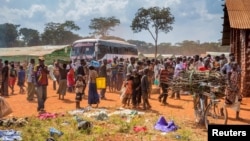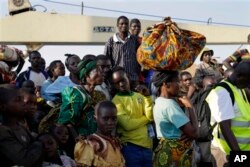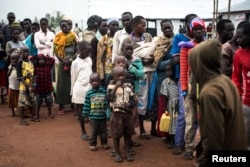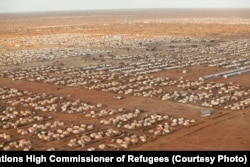Tanzania, Burundi and the U.N. refugee agency announced Thursday that they have reached an agreement to repatriate Burundian refugees who want to go home. Tanzania has been impatient to get the process started, and all parties now say they will work to facilitate the safe, dignified return of the refugees beginning in early September.
Tanzania’s president has faced criticism since he publicly urged Burundian refugees to go home last month.
Tanzania hosts more than 350,000 refugees from neighboring countries. More than two thirds of them are from Burundi.
Tanzania’s minister for home affairs, Mwigulu Nchemba, insists no refugees will be forced out of the country.
“These people have decided in their own, to us as stakeholders and governing body, we are only trying our level best to make sure that we facilitate and it’s provided,” said Nchemba.
Difficult process
The Ministry of Home Affairs says it has registered 11,000 Burundians for voluntary repatriation, but the process has been delayed.
The Burundian government has complained that returns have so far been chaotic and informal.
Officials from the two countries met with the U.N. Refugee Agency Thursday in Dar es Salaam.
“We are committed to support any refugee that expresses a voluntary request to return," said UNHCR representative Chansa Kapaya. "Indeed what we have discussed here is that this return should be in safety and dignity, and by safety we mean legal, physical and material safety. The political dialogue are still taking place. They haven’t been concluded, but the government of Burundi here has assured everyone that the returnees everyone will be accorded that physical security.”
Country in turmoil
Burundi has been in turmoil since 2015, when President Pierre Nkurunziza decided to run for a third term in office, an idea his opponents said violated the constitution and the accord that ended Burundi’s civil war.
Human rights groups say the past two years have seen unrest, political assassinations and attacks on civilians.
Tanzania and Uganda have tried to bring the government and the opposition together, but the peace talks have failed due to disputes over who should attend on each side.
“Tanzania should not be fooled, should not be misled," said Vital Nshirimana, the head of Burundi’s Forum for Strengthening the Civil Society. "As a civil society, what we think is to first of all solve ongoing conflict to put an end ongoing violence and then refugees will be able to return back to their motherland when they will know that they will no longer be persecuted by Imbonerakure militia men.”
Imbonerakure is the youth wing of Burundi’s ruling political party. The youth group is accused of attacking opponents and civilians.
Burden on poorest nations
Aid agencies see another trend at work in Tanzania’s readiness to help repatriate refugees — the strain emerging as the world’s poorest countries host the bulk of the world’s displaced. Eighty-four percent of people displaced at the end of 2016 were in developing nations.
Uganda recently welcomed its one millionth South Sudanese refugee. Most of them have arrived in the past year alone.
Meanwhile, Kenya threatened to shut its Dadaab refugee camp last year, home to more than 300,000 refugees mostly from Somalia. Kenya complained of security risks and a lack of support from the international community.
The U.N. World Food Program recently announced it must cut food rations to refugees in Tanzania amid funding shortfalls.
“Uganda is an excellent example of how international community is failing to support refugees as much as they should because Uganda itself is doing all they can," said Geno Teofilo who works with the Norwegian Refugee Council in East Africa. "They have a very good system of hosting refugees, but Uganda is a small country and it does not have a lot of resources. So far, more aid is needed from richer countries such as Europe and the United States to support these refugees.”
The process to repatriate the first Burundians from Tanzania is expected to begin September 7th. Burundi says it will open reception centers to receive its citizens.
Khaleed Abubakar Famau contributed to this report from Dar es Salaam.








